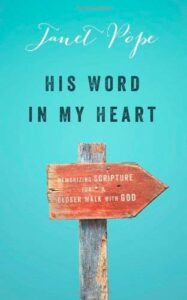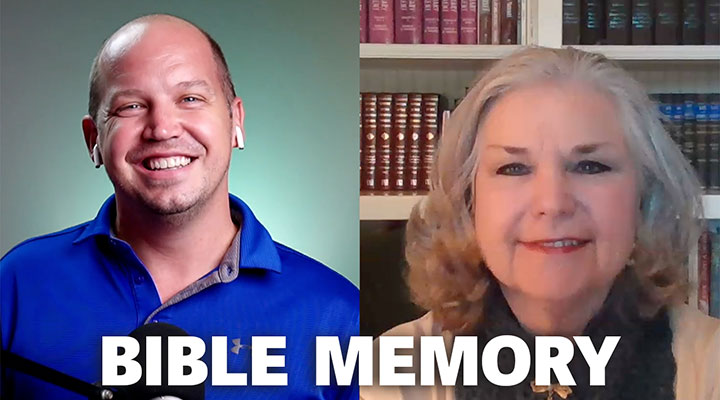Be encouraged and inspired by the PASSION Janet Pope has for God and for memorizing His Word!! Josh sits down to ask her about why she memorizes odd Psalms and how she meets with 20 other women for accountability. Watch the interview here:
Or you can listen to the Memorize What Matters podcast on your favorite player:
Listen to “The Sacred Beauty of Bible Memory (w/ Janet Pope)” on Spreaker.Follow along with all the Bible Memory Goal YouTube videos!
Make sure you grab a copy of Janet’s book, His Word in My Heart, on Amazon and visit her website to learn more about her ministry:
- His Word in My Heart on Amazon: https://geni.us/his-word-janet-pope
- Visit Janet Pope’s Website: http://www.janetpope.org
You can find this book and many other great resources for those who want to memorize Scripture on our list of the best Bible memory books to buy and don’t forget to check out our shop for fun ways to wear your Bible memory publicly!
If you’d like, you can read the transcript of the YouTube interview below.
Janet Pope Video Transcript
Josh: This week, I’m sitting down with Janet Pope, author of the fantastic book titled His Word in My Heart: Memorizing Scripture For a Closer Walk with God.
If you haven’t read the book, you really should grab a copy – I have a link in the description below this video. I ended up highlighting so much of my own copy and walked away myself so encouraged and inspired by her passion to know God.
And I think as you listen to this interview, that’s what you’re going to hear more than anything else: this reminder that memorizing Scripture is not about earning browning points with God, impressing your church or showing off how much you know. It’s about aligning our thoughts and focus on Him, and getting to know your Savior in the place He chooses to reveal himself: the Bible.
So let’s jump into this interview and start with the funny story of why Janet voluntarily chose to memorize the graphic and violent Psalm 79 that literally talks about how birds are eating dead bodies while blood flows through the streets.
Janet: Well, you know, Scripture claims that every word of God is profitable, all Scripture.
And so, when I was in seminary, our professor said, for an assignment, he wanted us to memorize a short psalm, but he said, “Don’t pick one of the popular ones. Pick something that no one would ever memorize, no one would choose to memorize, and then you’ll learn something.”
And so I was just thumbing through. And when I got to that, okay, dead people on the streets and blood, blood, and an angry jealous God. And I was like, “Okay, this is it.” So I really did it at first, just as an assignment. But as I got into it and saying the words, “Help us, oh God our savior, for the glory of your name, and may your mercy come quickly to meet us for we are in desperate need.”
And at that point I had been memorizing scripture for probably about 20 years. And so I knew that I always would find God in the scriptures. But through that psalm, I saw me, I saw humankind that we have all felt the same thing, desperate circumstances from the consequences of our own sin, and just crying out to God for His mercy and knowing that His mercy will be there for us.
So the Psalm is really special to me because not only do I see God, but I see myself. And when I say the words, I say them with passion, and with fervor, and just trusting that God will be there for me in my desperate situation.
Josh: Absolutely. I think that when I’ve been memorizing various portions of the Bible, one of the things that you say that I really liked…I can’t remember which book it was. It was one of the New Testament epistles that you felt like you owned that book.
That was your book, and I completely relate to that where, yeah, maybe I don’t understand all of it, but I’ve memorized that book, and that’s my book, the depth that I get from doing that.
And one of the things that you talked about early on in the book that I also resonated with, and I’m sure that anybody who’s been a believer for any period of time resonates with this, just this we have to all come to this point in time where we realized that our knowledge of God is much more shallow than we think.
And I remember you talking about that and I’ve felt that same thing where it’s like, I just don’t know God the way that I want to know God. How has memorizing really broadened that for you?
Janet: Well, first of all, I grew up in a very secular home. And so like, I didn’t know God. No one in my family knew God. We didn’t go to church. We didn’t pretend to go to church. We were just a secular family.
And when I came to know Christ in college, the whole world was open to me. I began to read the Bible for myself and started seeing all the stories that a lot of people learn when they’re a child, but I didn’t learn any of those.
So everything was new to me.
But it was 14 years until I became a Christian at 21. Then at 35, I sorta had my moment where I went to a conference. I heard someone from the audience recite the whole book of Colossians. And I sat there in my chair saying, “I don’t really know God, I really don’t.”
And I cried out to God on the way home, about a six hour drive, and I just said, “God, help me, I want to know you.” And I knew at that point that to know God meant to know His word, because God chose to reveal himself in His word. That’s where He chose to reveal himself. So if you wanna know God, then get the Bible.
So I didn’t really know where to start. But because I was inspired by this person who memorize scripture, I said, “I’m gonna memorize scripture.” So little by little, verse by verse, and I had read through the whole Bible several times, but there’s something about taking in every word and every verse, and then saying it over and over.
And you’re like, whoa, whoa. I’ve read this before, but now it’s so meaningful to me. So really it’s become the joy and passion of my life. I’ve been memorizing for 31 years now, and I hope till the day I die that I am still soaking in God’s word and reviewing God’s word and letting His word be in my heart and my thoughts.
Josh: And Janet, I have to say, your book, “His Word in My Heart,” you can feel that throughout reading the book. And I love that about the book, is that I can actually feel the passion that you’re expressing right now, and that is really so cool. I appreciate that, so I wanted to say thank you for that.
One of the things I wanted to ask you about is the fact that you say in the book that you know many godly men and women who don’t memorize Scripture. And same for me, many people that I highly respect, that at least to my knowledge are not actively memorizing Scripture.
And it’s not explicitly stated in the Bible that this is a discipline that we should be doing. So with that in mind, and also this idea that there are so many things that are explicitly stated in the Bible that still feel like I’m trying to make a part of my life, and my daily routine, and all that.
Do you think that that Scripture memory still has a really valuable place in a Christian’s daily or weekly life? And why would that be, or why not?
Janet: I think it’s the greatest possible way to really, really know God, is to memorize the word. Now that’s for me personally. But I would say that over the years, since I had been memorizing so long, I have sort of Softened my position a little bit.
When I first started memorizing, I was so fervent about it. I wanted everyone to memorize and I thought, “If you love Jesus, you have to memorize.” But as the years went on, I saw people that I know and love who are truly godly, now I don’t think a person can be a truly, truly godly God-fearing person if they’re not in the word, I think you have to be in the word.
You have to be a person of the word, because that’s where God reveals himself. But as far as memorizing, if you’re thinking God’s thoughts and your…The great command is to love God with all your heart, soul, mind, and strength. If you’re doing that without memorizing, then I say, okay, you get a pass.
For me, I can’t, because now that I’ve been there and I’ve tasted what it’s like, I really don’t wanna go back to reading a chapter. I’ve gotta soak it, and I’ve gotta say it over and over and over and over and over.
So, also, I have been to seminars that say we’re gonna talk about the spiritual disciplines. And I’m like, “Oh, I’m rah-rah. I can’t wait till they get to Scripture memory.” But maybe they start with fasting.
Now, fasting, okay, some people would say it’s commanded. I would say it’s not necessarily commanded, maybe assumed a little bit, but I’m not in the fasting. So with that said, I can
respect someone else who says, “I’m into journaling, I’m into whatever they’re into, but I’m just not into Scripture memory.
And I say, you know what, if you love God with all your heart, soul, mind, and strength, then you don’t have to memorize Scripture.
I know I do. I know I do. My default mode is self-absorption. So if I don’t memorize Scripture, my life is gonna be all about me, what I like and what I don’t like, and where I’m going, what I’m doing. It’s just gonna be me, me, me.
And so by memorizing Scripture, it takes me out of myself. It puts me with God in my thoughts and my focus are on Him. And at the end of the day, that’s what I want. I don’t wanna be self-absorbed, it’s exhausting. I want to be refueled and rejuvenated by the thoughts of God, not thoughts about me.
So, it has revolutionized my life and I am passionate about it. But not everybody is.
Josh: Yeah, and that is obvious. But I mean I think one of the things you said that I agreed with was it’s trading God’s thoughts for our thoughts. So it’s like you’re saying instead of those self-absorption or the things that just come to my mind as I’m driving down the road, or walking my dog, or whatever it is that I’m doing on kind of just my day-to-day activities, being able to trade that, that mindless kind of wandering for things that are the Scripture, as you were saying, that are useful for teaching, correction, all of these things that it says in 2 Timothy.
It makes a difference. And I’ve noticed that in my own life, and I can hear you talking about it even there. So one of the things I thought was kind of funny, you talk about, after some of your speaking engagements, you would have people come up to you and say, “One of the reasons why I fear knowing the Bible too much or I fear knowledge is because I fear that if I got that, then God would say, ‘okay, now I’m gonna put you in a very difficult situation.'”
And I find that ironic because my story is actually the opposite. I found myself in a difficult situation and realized, oh my gosh, my knowledge is not where I want it to be, and that’s kind of what started me on this journey.
So my question for you is in a world where most Christians tend to learn kinda vicariously through someone else’s study, what does it mean to love God with all of our minds?
Janet: I think that’s a hard question because I’m not so sure that when God said to love Him with all your heart, soul, mind, and strength, that we necessarily needed to compartmentalize each of those things. I think the concept is that every aspect of your being is to just be fully devoted to Him.
So when I think about loving God with all my mind, I think of just having an intentional pursuit of God, going after Him, saying, “Lord, I’m gonna sit here until I find you. I’m gonna read. I’m gonna go over the verses, I’m gonna seek you.”
I think God told Solomon, “If you seek me with all your heart, I will let you find me.” And so to me, to love God with all my mind is to say I’m going after it. I’m gonna read Haggai, and I’m gonna find God, and I’ll keep reading, and I’ll keep memorizing, and I’ll keep pursuing God cognitively, not just to say I feel good or I feel like I love God.
I wanna know that I love God. I wanna know who He is and why He acts the way He does. And the Bible is the place where God reveals himself. He reveals his heart, and His mind, and His ways, and the things He loves, the things He hates.
And those are the things that I wanna pursue, I wanna run after, I want to search out. So that’s what it means to me, not to passively say, “Okay, God, have your way with me.” Although that’s part of it too.
But to actively say, “Lord, I’m going after you. I’m gonna pursue you with everything I have.”
Josh: That’s great. I think that I’ve actually known people who’ve memorized Scripture, particularly in my childhood. There would be these Bible Bees or whatnot that I know now have fallen away from their faith. And I think it’s…You and I could both agree, and most people even listening to this could agree that Scripture memory does not equate to no necessarily knowing God or having an intimate relationship with God.
And I even find that as a struggle for myself sometimes where I’m just so… It takes dedicated focus to memorize, for me at least. And so, what is it that you do or what advice do you think you’d have to help add not just, “hey, I’m accomplishing something, I’m memorizing something, I’m doing something,” but adding in that element of what I’m hearing you talk about so much, which is just that knowing God, that really getting that intimate relationship with Him?
Is there something that you’re doing other than just repeating it over and over? Are you studying alongside that or how exactly do you go about that?
Janet: I am a books person, and I’ma learner, and I love books, so I have lots of really good commentary. So I will have, let’s say my commentary on Colossians, which I just recently finished, and so I’ll have that with me.
And sometimes I look things up, but sometimes I just try to take it at face value first. I think when people say to me, “I’m sort of getting burned out,” I say, “Take a break.” Now, don’t take a break from God. Don’t take a break from His word, but take a little bit of a break from Scripture memory.
Because to me, when Scripture memory becomes a chore or work, then I lose my delight in it.
So it’s possible that you have put yourself on a pace that is forcing you to not have the luxury and the leisure of just delighting in God’s word, because it sounds like you’ve put yourself on an aggressive path.
Like I’ve got X amount of time and I’ve got to do that. So for me, I don’t have any of those goals. at the beginning of the year, I say, “Lord, what do you want me to memorize this year?”
And so, I’ll think through lots of different things and I’ll write some things down in my prayer book, and usually I don’t get to all of them. So I would say don’t go at such a pace that it becomes work.
And I always say it out loud. And to me, I’m talking to myself. I’m talking to God. I’m communing with Him. It’s not work for me, but maybe it’s because I don’t put myself in such a pace that it becomes work.
Josh: That’s a really good point. I mean I enjoy setting goals, but you’re right. If the whole point is to just meet that goal, then I’ve missed the purpose of this altogether. But yeah, I understand
exactly what you’re saying and that makes a lot of sense.
So then for you, what would you say is your ultimate goal for memorizing?
Janet: Well, interesting, I don’t have like…Okay, so I’m at 19 books right now, but I only know that because people ask me. I’m not counting the verses. I’m not counting the chapters.
I don’t really.
So if I have 30 more years, which I really hope God takes me before then, but I wanna walk with God. I wanna know God, love God, and just walk closely with Him. That really is my goal.
I don’t wanna be the Scripture memory queen. I don’t wanna be the person they say. Well, tell me about Janet Pope. Oh, she memorizes God’s word. I want people to say she loves Jesus, and she walks with Him, and there’s no one that…Because she is in His word and saturating her mind and heart with His word, she knows Him, she loves Him, she walks with Him.
That’s my goal. And because I’m in the word so much, I know when I’m not walking with God. His word just whips me up one side and down the other. I mean I know when God is convicting me that I’m playing church, or I’m doing this, or my heart isn’t right, whatever, because my heart, I want my heart to be bent toward Him, not just go through the motions.
So I don’t have a specific goal, but I’m going to keep memorizing.
Josh: Is there any kind of advice or something that you would share with somebody who does recognize the value of memorizing God’s word and understanding him more based on your 30 years of doing this that you could share with somebody who’s watching or listening right now?
Janet: Okay, well, I would say start with something very small. Pick a song that you have always loved, but you never memorized. Pick up something like Isaiah 40 or something, you know, Psalm 121.
“I lift my eyes to the hills. Where does my help come from? My help come from the Lord, the maker of heaven and earth.”
So something that inspires you, that you would like to be saying, and get a partner. Ask someone else. Do you wanna memorize something? And either pick something that you’re both gonna memorize together or pick two different things.
I’m gonna memorize Isaiah 40 and you’re gonna memorize Isaiah 55, and then we’ll share them with each other. So I have a Scripture memory group. We meet once a month, and we’ve been meeting on zoom for a year. Although some people meet in person.
They’re back in Dallas. And all we do during that one hour is recite Scripture. Because we have about 17 people now, but maybe on any given month, we only have about 10. And we take three minutes and it’s my turn, and then I’ll share one chapter, and someone else will share a chapter, and everyone’s memorizing something different.
But all we do is we’ve listened to God’s word being spoken by God’s daughters, and then we hug each other, and then we leave. And it’s so edifying because we’re all hearing God’s word spoken out loud.
So there’s something about sharing Scripture. That’s the deepest sense of fellowship, is sharing Scripture with someone else and what it’s doing in your life, and then they’re sharing what it’s doing in their lives. So I would say get a partner or get a group.
Josh: I completely agree with that, yeah. I’ve noticed that it’s not very appropriate to just go up to a random person at church and say, “Hey, I just finished this chapter of the Bible. Can I recite it to you?”
It’s kinda awkward and it seems a little bit of self-promotion in a way, but I like what you’re saying where if you have this group where that’s what you meet for and it’s edifying to everybody in the group, it can be just such a neat experience.
Janet: Well, it’s really the highlight of our month because everyone’s doing something different, and somehow it all comes together, and people are memorizing different versions.
I don’t know, it’s just beautiful. We’ve been doing it for about 12 years now.




Leave a Reply